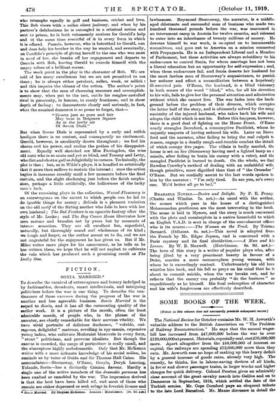FICTION.
SONIA MARRIED.*
To describe the carnival of extravagance and luxury indulged in by fashionables, decedents, smart intellectuals, and intriguing politicians before the war is one thing. To describe the con- tinuance of these excesses during the progress of the war is another and less agreeable business. Sonia Married is the sequel to Sonia, and it has all the coruscating quality of the earlier work. It is a picture of the moods, often the least admirable moods, of peOple who, in the phrase of the narrator, are chiefly remarkable for their nervous vitality. We have vivid portraits of delirious duchesses, " voluble, out- rageous, delightful " matrons, revelling in spy-mania, expensive young ladies, who cultivate Modernist bizarrerie in every form, " stunt " politicians, and perverse idealists. But though the canvas is crowded, the range of portraiture is really small, and the atmosphere highly melodramatic. Only that. Mr. McKenna writes with a more intimate knowledge of his social milieu, he reminds us by turns of Oujda, and Sir Thomas Hall Caine. His nomenclature--Stornoway, O'Rane, Grayle, Deryk Lancing, Yolande, Sonia—has a distinctly Cainian flavour. Hardly a single one of the active members of the dramatis personae has been exalted or ennobled by the war. The impression derived is that the best have been killed off, and most of those who remain are either depressed or seek refuge in feverish license and • Boma Married. By Stephen XCX0D.11%. landau Rutohloson. Os. 9d. ae9.1 lawlessness. Raymond Stornoway, the narrator, is a middle- aged dilettante and successful man of business who made two hundred thousand pounds before the war, was marooned in an internment camp in Austria for twelve months, and released to enter into an inheritance of twenty millions of money. He devotes himself to war work, is co-opted on to innumerable committees, and goes out to America on a mission connected with Propaganda. He is an Independent Liberal and a Member of Parliament, but these activities are always subsidiary to his
endeavours to control Sonia, for whom marriage has not been a liberal education but an opportunity for self-expression ; and, when these endeavours fail, and .Sonia deserts her husband for the most lawless man of Stornoway's acquaintance, to punish her seducer and effect a reconciliation between a hopelessly ill-assorted pair. O'Rane, the husband, is a blind viainnary in both senses of the word " blind," who, for all his devotion to his wife, fails to give her the personal attention and admiration without which she cannot live. The war fades into the back- ground before the problem of their divorce, which occupies the latter half of the story, and is ultimately solved by the mag- nanimity of the injured husband, who takes back his wife and adopts the child which is not his. Before this happens, however, there is a good deal of fighting on the Home Front. O'Rane nearly strangles Beresford, a consumptive Pacificist, whom he unjustly suspects of having seduced his wife. Later on Beres ford and the narrator, after failing to bring the real culprit t4 reason, engage in a deadly rough-and-tumble combat the detail of which occupy five pages. The villain is badly mauled, the house is set on fire (Stornoway having used a lighted lamp as e missile, after failing to brain his enemy with a ruler), and the
mangled Pacificist is burned to death. On the whole, we find Rawdon Crawley's method of dealing with an unfaithful wife, though primitive, more dignified than that of " the Crusader O'Rane. But we cordially assent to the last words spoken tc him by the narrator : " I'm only tired. So are you, so's every one. We'd better all go to bed."
READABLE NOVELS.—Deaire and Delight. By F. E. Penny. (Chatto and Windus. 7s. net.)---As usual with the author, the scenes which pass in the house of a distinguished Mohammedan gentleman are the most interesting in the book. The scene is laid in Mysore, and the story is much concerned with the plots and counterplots in a native household to which an English V.A.D. is sent in charge of the convalescent officer who is its master.—The Woman on the Trail. By Tristan Bernard. (Odhams. 6s. net.)—This novel is adapted from the French by Mr. Edgar Jepson, and is concerned with a Paris mystery and its final elucidation.—A Man and his Lesson. By W. B. Maxwell. (Hutchinson. 6s. 9d. net.)-- The hero of this story is a writer of popular plays who, after being jilted by a very prominent beauty in favour of a Duke, marries a more commonplace young woman, with whom he is exceedingly content. Unfortunately his old love whistles him back, and his fall so preys on his mind that he is about to commit suicide, when the war breaks out, and he reflects that the enemy can probably " do the business " as expeditiously as he himself. His-final redemption of character and his wife's forgiveness are effectively described.


































 Previous page
Previous page